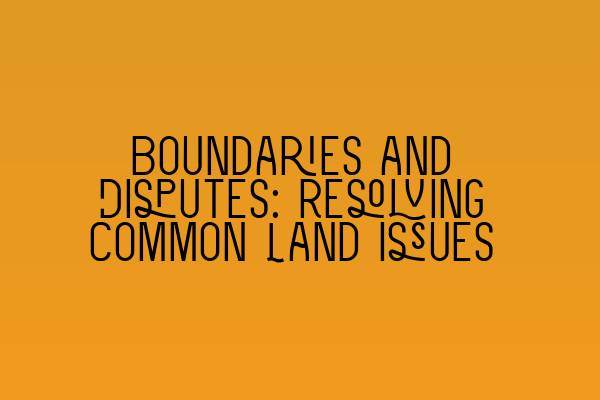Boundaries and Disputes: Resolving Common Land Issues
Welcome to the blog of SQE Property Law & Land Law. In today’s post, we will be discussing a topic that is of utmost importance to property owners and buyers: boundaries and resolving common land issues. Issues surrounding property boundaries can quickly escalate into disputes, causing stress and complications for all parties involved. Understanding your rights and obligations when it comes to property boundaries can help you navigate these challenging situations more effectively.
The Importance of Clearly Defined Boundaries
Clear and legally defined boundaries are crucial to safeguarding the interests of property owners. Boundaries provide certainty and delineate the extent of a property, protecting it from encroachments and unauthorized use. When boundaries are clearly defined, property owners can confidently enjoy and utilize their land without fear of trespass or infringement by neighboring properties.
Types of Boundary Disputes
Boundary disputes can arise due to various reasons, including:
- Unclear or disputed boundary lines
- Encroachment onto neighboring property
- Disputes over rights of way
- Boundary misrepresentation during property transactions
These disputes may be between neighboring residential properties, commercial properties, or even involve public land. Resolving these disputes can be complex and requires a comprehensive understanding of property law.
How to Resolve Boundary Disputes
When faced with a boundary dispute, it is recommended to take the following steps:
- Review your title deeds: Start by thoroughly examining your title deeds and any relevant documents that outline the boundaries of your property. This information will serve as a crucial reference point.
- Seek legal advice: Consulting an experienced property law solicitor is essential to understanding your rights and obligations. They will guide you through the legal process and provide expert advice on resolving the dispute.
- Mediation: In many cases, disputes can be resolved through mediation. A neutral third party can help facilitate communication and negotiate a mutually acceptable resolution.
- Boundary agreement: If both parties agree to a solution, a boundary agreement can be drawn up to legally document the revised boundary lines.
- Litigation: In more complex and contentious cases, litigation may be necessary. A solicitor experienced in property law can represent you in court and protect your interests.
It is important to note that each dispute is unique, and the resolution process may vary accordingly. Seeking legal advice is crucial to ensure you have a comprehensive understanding of your options and the potential outcome.
Prevention is Better than Cure
While resolving boundary disputes is essential, it is always better to prevent them altogether. Here are some proactive steps you can take:
- Perform a thorough property survey: Engage a qualified surveyor to conduct a detailed survey of your property boundaries. This will help identify any potential issues or discrepancies.
- Communicate with neighbors: Open and respectful communication with your neighbors can help address any concerns or discrepancies before they escalate into major disputes.
- Document alterations or additions: If you plan to make any alterations or additions to your property, ensure that they comply with local building regulations and do not encroach onto neighboring land.
By taking these proactive measures, you can minimize the risk of boundary disputes and maintain positive relationships with your neighbors.
Conclusion
Resolving boundary disputes requires a careful and considered approach. By understanding your rights and seeking legal advice, you can ensure that your interests are protected throughout the process. Remember, prevention is always better than cure, so be proactive in maintaining clear and well-defined boundaries for your property.
For more information on property law and preparing for the SQE exams, check out our related articles:
